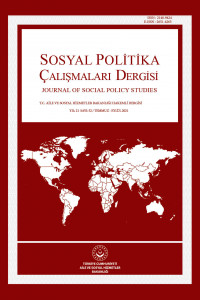Öz
This study was conducted in three different socioeconomic districts in Ankara to examine the effect of economic factors on the quality of marriages. This study initially collected data from 211 married couples (422 married individuals), to develop the Marital Quality Scale (MQS) and for the Family Economic Strain Scale (FESS), an adaptation study was performed. Then, the researchers met with 278 married couples (556 married individuals) and by using the data obtained, the Marital Quality Model Test was established. Then, the researchers met with 278 married couples (556 married individuals) and by using the data obtained, the Marital Quality Model Test was established. The MQS is a 5-factor with 42 items. This study determined that the MQS is a valid and reliable scale for Turkey. A dyadic model test was performed, and this study examined the role of “couple burnout” (mediation or moderation) in the relationship between “family economic strain” and “marital quality” of males and females. The mediation and the moderation roles of couple burnout were analyzed using the mediation model of heterosexual couple solidarity (Actor-Partner Interdependence Mediation Model–APIMeM) and the moderation model of heterosexual couple solidarity (Actor-Partner Interdependence Moderation Model–APIMoM), respectively. The model test results showed that the relationship between economic strain and marital quality did not vary by couple burnout; however, as the couple burnout perceived by couples increased, the marital quality of each spouse significantly decreased. Moreover, economic strain experienced by spouses decreased marital quality by mediating the couple burnout experienced by individuals or their spouses. Lower marital quality was mostly due to his/her own couple burnout, and slightly because of the couple burnout experienced by his/her spouse. In light of its findings, this study offers suggestions to researchers, academicians and institutions.
Anahtar Kelimeler
Marital Quality Marital Quality Scale Family Economic Strain Couple Burnout
Kaynakça
- Hilton, J. M., & Devall, E. L. (1997). The family economic strain scale: development and evaluation of the instrument with single and two-parent families. Journal of Family and Economic Issues, 18(3), 247-271.
- Çapri, B., & Gökçakan, Z. (2012). Eş tükenmişliğinin yordanmasında cinsiyet farklılıkları. Trakya Üniversitesi Eğitim Fakültesi Dergisi, 2(2), 35-53.
Öz
Bu çalışma, ekonomik faktörlerin evlilik kalitesine etkisini incelemek amacıyla Ankara’da farklı sosyo-ekonomik düzeydeki üç ilçede yürütülmüştür. Bunun için öncelikle 211 evli çiftten (422 evli birey) veri toplanarak Evlilik Kalitesi Ölçeği (EKÖ) geliştirilmiş ve Aile Ekonomik Güçlük Ölçeğinin (AEGÖ) uyarlama çalışması yapılmıştır. Daha sonra 278 evli çift (556 evli birey) ile görüşülerek elde edilen verilerle Evlilik Kalitesi Model Testi kurulmuştur. Son formu ile EKÖ’nün 5 faktörlü ve 42 maddeden oluşan geçerli ve güvenilir bir ölçek olduğu belirlenmiştir. Yapılan dyadic model testi ile kadın ve erkeklerin “aile ekonomik güçlüğü” ile “evlilik kalitesi” arasındaki ilişkide “eş tükenmişliği”nin rolü incelenmiştir. Eş tükenmişliğinin aracı rolü, Heteroseksüel Çift Dayanışması Aracı Modeli (APIMeM) ile; etkileşim rolü ise Heteroseksüel Çift Dayanışması Etkileşim Modeli (APIMoM) ile analiz edilmiştir. Model testinden elde edilen sonuçlar, ekonomik güçlükle evlilik kalitesi arasındaki ilişkinin eş tükenmişliğine bağlı olarak değişmediğini, ancak çiftlerin eş tükenmişliği arttıkça, eşlerin her ikisinin de evlilik kalitesinin anlamlı olarak düştüğünü göstermiştir. Bunun yanı sıra, eşlerin yaşadıkları ekonomik güçlük, kendilerinin ve/veya eşlerinin yaşadıkları eş tükenmişliği aracılığıyla evlilik kalitelerini düşürmektedir. Eşin evlilik kalitesinin düşük olması ise büyük ölçüde kendi eş tükenmişliği, nispeten de eşinin yaşadığı eş tükenmişliği nedeniyle gerçekleşmektedir. Çalışmadan elde edilen bulgular doğrultusunda araştırmacılara, akademisyenlere, kişilere ve kurumlara yönelik çeşitli öneriler sunulmuştur.
Anahtar Kelimeler
Evlilik Kalitesi Evlilik Kalitesi Ölçeği Aile Ekonomik Güçlüğü Eş Tükenmişliği
Kaynakça
- Hilton, J. M., & Devall, E. L. (1997). The family economic strain scale: development and evaluation of the instrument with single and two-parent families. Journal of Family and Economic Issues, 18(3), 247-271.
- Çapri, B., & Gökçakan, Z. (2012). Eş tükenmişliğinin yordanmasında cinsiyet farklılıkları. Trakya Üniversitesi Eğitim Fakültesi Dergisi, 2(2), 35-53.
Ayrıntılar
| Birincil Dil | Türkçe |
|---|---|
| Bölüm | Makaleler |
| Yazarlar | |
| Yayımlanma Tarihi | 30 Eylül 2021 |
| Yayımlandığı Sayı | Yıl 2021 Cilt: 21 Sayı: 52 |


